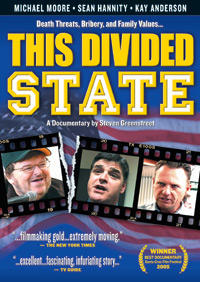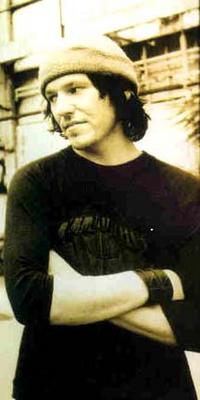
The week "Fahrenheit 9/11" came out Christy and I went to see it. I was excited actually, because I have always been entertained by Moore’s documentaries. “Roger and Me” is funny, and Christy and I still quote parts of it (at one point Moore visits a Flint citizen who has resorted to raising rabbits as an added source of income…there is a sign in front of the house that says: Rabbits—pets or meat. Now that’s tragic comedy). “The Big One” was interesting, and in the end I liked it better than “Roger and Me.” I haven’t seen any episodes of “The Awful Truth”, but I did watch “Bowling for Columbine.” Anyone
 who knows me is aware that I enjoy competition rifle shooting. I am a believer in a citizen’s right to keep and bear arms, and believe that it is a natural extension of the inalienable rights spoken of in the Constitution. In Bowling for Columbine, were some cheap shots taken? Yes. Was some of it underhanded? Yes. Was there some manipulation? Yes. Were there a few “stretchers”? Yes. Did I laugh? YES. Was I threatened? No. In fact, I appreciated the film just because Moore was asking some very fascinating questions to his audience, questions to which we still need answers. Why the preoccupation with violence in America? Are gun rights the cause of current gun violence, or is the cause something bigger? What needs to change as a culture and a society in order for us to curb crimes committed with guns, and dare I say crime in general? This isn’t to say that I came to the same conclusions that Moore came to, but I realized where he was coming from and appreciated the questions.
who knows me is aware that I enjoy competition rifle shooting. I am a believer in a citizen’s right to keep and bear arms, and believe that it is a natural extension of the inalienable rights spoken of in the Constitution. In Bowling for Columbine, were some cheap shots taken? Yes. Was some of it underhanded? Yes. Was there some manipulation? Yes. Were there a few “stretchers”? Yes. Did I laugh? YES. Was I threatened? No. In fact, I appreciated the film just because Moore was asking some very fascinating questions to his audience, questions to which we still need answers. Why the preoccupation with violence in America? Are gun rights the cause of current gun violence, or is the cause something bigger? What needs to change as a culture and a society in order for us to curb crimes committed with guns, and dare I say crime in general? This isn’t to say that I came to the same conclusions that Moore came to, but I realized where he was coming from and appreciated the questions.He has an agenda. You’re a fool if you disagree. Is it a bad one? That is up to interpretation. Do I believe that he, in his heart of hearts, is trying to make our country better and assist them in seeing things from another perspective so as to generate some thoughtful debate and careful consideration of stance? Yes.
Now, when Christy and I walked out of Fahrenheit 9/11 we both had sick feelings in our stomachs. One could argue that either the subject matter sickened us, or the way it was presented sickened us. I’d say some of both. I didn’t feel it was an objective look at the Bush Administration, and I really didn’t expect it to be going in. On the other hand it pained me to see our Commander-in-Chief fumble around like a goofball and say some ridiculously callous statements. Through further investigation I learned what was in context, what what was taken out of context, what manipulations were occurring where, editing tricks, and all of the post-production emotional play. Parts of the film angered me and parts I felt were downright disrespectful, yet still other portions of the film I found revealing (in particular the segment on military recruitment).
A year ago when Michael Moore came to Orem, Utah to speak at UVSC the community was in upheaval. I had seen the controversial film, but unlike a few people here I didn’t think he was the Anti-Christ come to pervert the ways of our innocent little community. I didn’t go. I have close friends who did, and enjoyed it. There is a documentary feature that came out recently about the whole c
 ontroversial visit, made by a former BYU student with liberal politics named Steven Greenstreet. The film is called “This Divided State,” and it is an entertaining look at the fiery sentiments that pervaded the community that week. It is pretty even-handed for the most part (it lacks a chunk of the moderate voice, but admittedly you only have an hour and a half—and seriously, what’s more compelling? Yup. Extremes.), and addresses a few of the issues that I raised in this blog. I enjoyed the film very much, and felt it was a slice of real American pie. It addresses those matters that divide us both as country and state, but personalizes things even more by addressing the political gap that causes disunity in the LDS religion. It unveils the dirty mask of intolerance, and ultimately plays out the disintegration of a relationship between two best friends. Though framed by the Michael Moore visit, love him or hate him, there are bigger things at play in this film, and I recommend it to anyone who might be interested.
ontroversial visit, made by a former BYU student with liberal politics named Steven Greenstreet. The film is called “This Divided State,” and it is an entertaining look at the fiery sentiments that pervaded the community that week. It is pretty even-handed for the most part (it lacks a chunk of the moderate voice, but admittedly you only have an hour and a half—and seriously, what’s more compelling? Yup. Extremes.), and addresses a few of the issues that I raised in this blog. I enjoyed the film very much, and felt it was a slice of real American pie. It addresses those matters that divide us both as country and state, but personalizes things even more by addressing the political gap that causes disunity in the LDS religion. It unveils the dirty mask of intolerance, and ultimately plays out the disintegration of a relationship between two best friends. Though framed by the Michael Moore visit, love him or hate him, there are bigger things at play in this film, and I recommend it to anyone who might be interested.

 Two years ago tomorrow Elliott Smith committed suicide. I never knew him as a person, and I have only two connections with him 1) We share the same birthday—Aug. 6th, and more importantly 2) I am in extreme awe of the music he created. I knew a kid at my previous employer, who found out that I liked Elliott’s music. He approached me and said, “I heard you listen to Elliott Smith.” I replied, “Yes, I do. I love his music.” He then exclaimed “I WORSHIP ELLIOTT SMITH!” I kind of laughed and said something to the effect that “worship” is a word I generally save for someone else, but that I could tell he was passionate about Elliott’s music.
Two years ago tomorrow Elliott Smith committed suicide. I never knew him as a person, and I have only two connections with him 1) We share the same birthday—Aug. 6th, and more importantly 2) I am in extreme awe of the music he created. I knew a kid at my previous employer, who found out that I liked Elliott’s music. He approached me and said, “I heard you listen to Elliott Smith.” I replied, “Yes, I do. I love his music.” He then exclaimed “I WORSHIP ELLIOTT SMITH!” I kind of laughed and said something to the effect that “worship” is a word I generally save for someone else, but that I could tell he was passionate about Elliott’s music.

